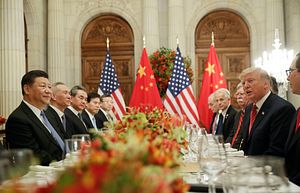The foreign policy establishment in Washington has recently come to the realization that a new strategy is needed in the American relationship with China. In their view, the old policy rested on the false assumption that China would grow increasingly like the West through constructive engagement. However, China has not only failed to become more free, politically or economically, it has risen as a global superpower propagating its own development model elsewhere in the world. To counter this, the U.S. approach toward China under the Trump administration has quickly turned to all-out confrontation, sharply rebuking Beijing’s practices and downplaying areas of potential cooperation. But this shift is neither the beginning of a new trajectory nor a specific feature of this administration. In many ways, frustration with China’s rise has been broadly felt across the political spectrum, among members of the legislature and the non-government foreign policy community. While the effect of a trade truce coming out of the G20 may be short-lived, Washington’s overall tougher stance on China may represent an overarching, self-sustaining framework in U.S. policy in Asia for years to come.
This White House has delivered a series of rebukes in the U.S.-China relationship, which to many, seem like a turning point: labeling China a “revisionist power” in major security policy documents, criticizing Beijing’s ambitious Belt and Road Initiative, and calling out its intellectual property theft and “whole-of-government” approach to projecting influence. However, the concern that China is emerging as a major rival is not a new mindset; its presence could be felt in earlier administrations and iterations of Congress.
During the George W. Bush administration, Secretary of State Condoleezza Rice called for deepening economic ties while containing China’s power and strategic ambitions. As a result, strategies such as the Trans-Pacific Partnership and strengthening ties with India started to take shape. Similar policies continued in the Obama administration with its signature “Pivot to Asia” strategy (later dubbed a rebalance) aimed at solidifying partnerships to hedge against a growing China.
Capitol Hill has always been more outspoken in its criticism of China. Now that this traditional position has aligned with the Trump administration’s antagonistic stance towards China, Congress has stepped into deeper hostility. For example, prominent members of Congress commended controversial remarks by FBI Director Christopher Wray about Chinese influence penetrating all levels of American society. This vocal sentiment is mutually reinforcing, and it has led to the passage of anti-China legislation, including laws to bolster the American strategic relationship with Taiwan.
Despite repeated warnings from Chinese President Xi Jinping on U.S. “meddling” in Taiwan — long considered an American bulwark in the Pacific — the bipartisan commitment to the island has never been stronger. This has manifested in renewed arms sales to the island and the unanimous passage of the Taiwan Travel Act, which facilitates exchange between American and Taiwanese officials. More generally, the 2019 National Defense Authorization Act was largely seen as anti-China because it includes provisions to strengthen security ties with Taiwan and to counter Chinese militarization in the South China Sea. To stem the flow of Chinese investment on national security grounds, Capitol Hill has also expanded the powers of the Committee on Foreign Investment in the United States (CFIUS), a measure thought to target Chinese sources of investment.
Not only have these legislative measures directed at China passed with bipartisan support, this sentiment pervades the congressional freshman class of 2019, despite its newness to Washington’s foreign policy discussions. Statements on the campaign trail often mentioned U.S.-China relations revolved around the trade war and great power rivalry. New members of the 116th Congress were quick to call China an unfair trade partner, a thief of intellectual property and a geopolitical rival. Although there may be no direct link between election results and a tough stance on China, the significant number of mentions during the campaign shows that candidates believed it would help their chances. This signals that a bipartisan consensus to be tough on China will likely prevail, at least in the near future.
The nongovernmental foreign policy establishment, both conservative and liberal, is no exception to this shifting attitude toward China. Think tanks and other foreign policy organizations play a pivotal role, not just in proposing and advocating for policies, but because of the well-known revolving door between the staffs of these institutions and the government. Available literature shows a general shift in policy discourse from engaging and leveraging the relationship with China to solve problems, to focusing on the intensifying U.S.-China rivalry. This by now common viewpoint will serve to influence and reinforce the stance taken by the administration and Congress, through lobbying, training future government staff and suggesting policies that sway foreign policy discussions.
The unraveling American policy of engagement with China, slowly being eclipsed by a more confrontational and competitive approach, is both a result of domestic political factors as well as the realization that continued engagement with China has yet to produce a Western-style liberal democracy. While the Trump administration’s actions have helped to speed up this shift, a hard-liner tendency has long existed within the broader spectrum of American foreign policy, including the legislative branch and the non-government foreign policy community. This aligned trifecta will sustain a competitive rather than cooperative U.S. attitude vis-a-vis China, even in the absence of a continuing escalation of hostility from both sides.
Zoe Leung is senior program associate and Michael Depp is program coordinator with the EastWest Institute, which creates constructive dialogues aiming at preventing conflicts.
The views expressed here are solely those of the authors and do not necessarily reflect the views of the EastWest Institute.

































